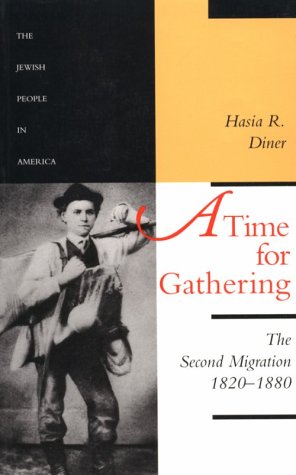And I don’t mean Julius Rosenwald.
I was at a dinner party Sunday night and was discussing the new work in progress of The Rosenwald Schools which is all about Julius Rosenwald’s father, Samuel, who worked as a pack peddler when he first arrived in Baltimore in the 1850s. Because of this great story, mid-19th century Jewish peddlers are a central subject in the new work in progress (which premiered here at the Washington D.C. JCC on April 13th). One of the guests at the dinner party, Art Allen, said his great-great-grandfather had been a peddler of some renown, and went on to describe a photograph of him, Mr. Isaac Wolfe Bernheim, as a young pack peddler in Kentucky.
It didn’t take long before I realized that I knew this photo well and had actually included in the peddlers section of my new work in progress. I first encountered the image on the cover of Dr. Hasia Diner’s book A Time for Gathering: The Second Migration, 1820-1880. Dr. Diner will be in the film, describing Samuel Rosenwald and the fascinating trade of the Jewish peddler. The original photograph lies in the Archives and Special Collections at the University of Louisville, and we licensed it from them for use in The Rosenwald Schools.

A Time for Gathering: The Second Migration, 1820-1880
Like Samuel Rosenwald, Bernheim quickly made his way out of the profession of peddler and became a very wealthy man who established the the Bernheim Arboretum and Research Forest near Louisville, Kentucky. Art tells a colorful version of his great-great-grandfather’s story, which I’ll share with you here with his permission:
As for I.W., he was cranky and short and settled in Louisville after creating his whiskey business in Paducah, Ky., where he and a former Civil War vet called their whiskey I.W. Harper. Last I heard it was popular in Japan. I heard a lot of stories about I.W., many of which may even be true. Someone told me that when Prohibition hit, I.W. sold the whole business. He went into philanthropy and became an advocate of extreme assimilation, once holding a debate with Rabbi Stephen Wise over his (I.W.’s) proposal to change the Sabbath to Sunday and rename synagogue “church.” He committed suicide at age 95 in 1945 by jumping out of the window of a hotel in San Francisco. He left $1 million to each of his five kids, who fought over the money. They were known in Cincinnati circles as “the battling Bernheims.” One of his sons became a famous Johns Hopkins surgeon — Bernard Burnham (many of the kids WASPified their names); a skinny little grandson everyone called Tubby Burnham created Drexel Burnham Lambert. He died a few years ago.
Many thanks to Art for sharing this wonderful coincidence with me.
Arthur Allen is an editor at Politico and a freelance writer in Washington D.C. He’s the author of Vaccine: the Controversial Story of Medicine’s Greatest Lifesaver (WW Norton, 2007), Ripe: The Search for the Perfect Tomato (Counterpoint, 2010) and The Fantastic Laboratory of Dr. Weigl (WW Norton, July 2014).
Edit, May 28, 2014: After reading this blog post, one of our recent interviewees, Rabbi Howard Berman shared some more information about Bernheim with us. Isaac Bernheim endowed the first library building on the campus of America’s first rabbinical seminary, the Hebrew Union College in Cincinnati. This library became the home of the American Jewish Archives in 1948

